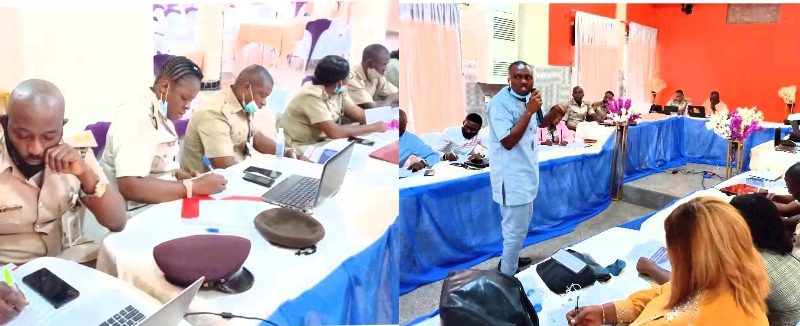UNODC Empowers NAPTIP and NIS to Combat Trafficking in Persons and Smuggling of Migrants With Data Collection and Analysis
Oru Leonard
18 November 2021 – What are the prevalent forms of trafficking and are they evolving? Who are the victims and where are they from? Are women and girls more affected? How do traffickers operate? Answering these questions is critical not only to better understand trafficking in persons but most importantly, to better prevent and combat this crime and its complex and always evolving dynamics. Reliable, sufficient and up to date data can provide these critical answers.
This is the reason why UNODC, with funding from the Government of Canada, is currently training no less than 120 officers of the Nigeria Immigration Service (NIS) and National Agency for the Prohibition of Trafficking in Persons (NAPTIP) on data collection and analysis in order to combat trafficking in persons and smuggling of migrants.
In order to ensure sustainability and ownership by NAPTIP and NIS, the six trainings conducted in the six geopolitical zones of the country are facilitated by NAPTIP and NIS officers who benefited from a training of trainers in June 2021.
Following the methodology of UNODC Global Report on Trafficking in Persons and UNODC Observatory on Smuggling of Migrants, the training focuses on data collection paying attention to tracking and mapping offenses, profiles of victims and migrants, perpetrator backgrounds and forms of exploitation, and communicates best practices on data collection and analysis.
Training sessions already took place in Enugu for NAPTIP and NIS officers based in South-East states, as well as in Osogbo (South-West). This week’s session is taking place in Benin City (South-South), and benefits not only NAPTIP and NIS officers but also members of the Edo State Taskforce Against Human Trafficking. Three more sessions are planned in the upcoming weeks in Makurdi (North Central), Maiduguri (North East) and Kano (North West).
The Governor of Edo state, His Excellency, Godwin Obaseki, who was represented by the Head of Service, Mr. Anthony Osas Okungbowa emphasized that “following the establishment of the Edo State Task force Against Human Trafficking, the state government has gathered data of over 5000 returned migrants in its database which covers biodata, personal experiences and details of traffickers but there’s still need to further gather and use data.”
In his keynote speech, the Attorney General and Commissioner for Justice, Edo state, Mr. Oluwole Iyamu SAN underscored that “when law enforcements understand analysis, they can narrow it further and use it to predict when and where certain types of crime are most likely to occur and the general responses to such crimes. Advanced data analysis permits to institute preventative measures resulting in reduction of crimes which are prevalent in particular areas of Edo State.”
In his goodwill address, NAPTIP South South Regional Director, Mr. Effeh Ekrika, stated that “this training is apt and strategic as officers will be very well equipped to provide evidence-based response to trafficking in persons and smuggling of migrants. I call on all participants to show commitment in view of the importance that the agency attaches to the training.”
(UNODC Media)




